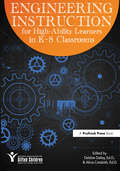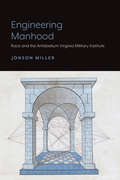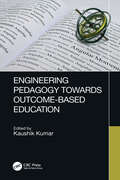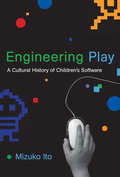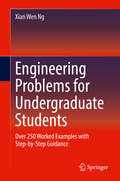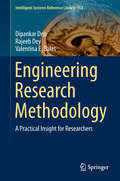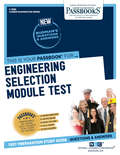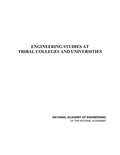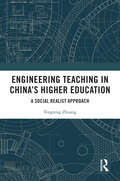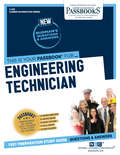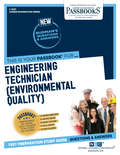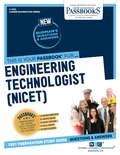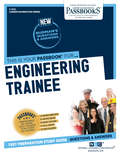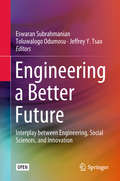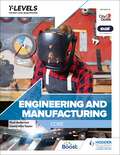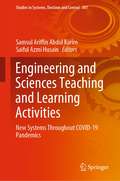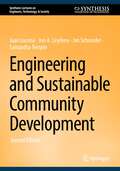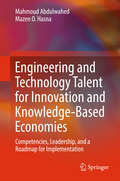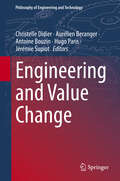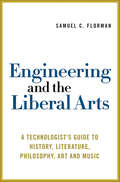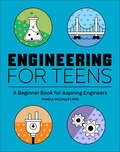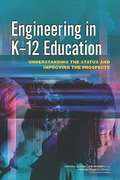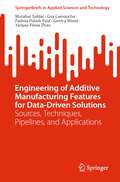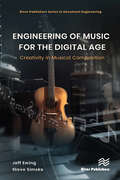- Table View
- List View
Engineering Instruction for High-Ability Learners in K-8 Classrooms
by Alicia Cotabish National Assoc For Gifted ChildrenEngineering Instruction for High-Ability Learners in K-8 Classrooms is an application-based practitioners' guide to applied engineering that is grounded in engineering practices found in the new Next Generation Science Standards (NGSS) and the Standards for Engineering Education. The book provides educators with information and examples on integrating engineering into existing and newly designed curriculum. The book specifies necessary components of engineering curriculum and instruction, recommends appropriate activities to encourage problem solving, creativity, and innovation, and provides examples of innovative technology in engineering curriculum and instruction. Additionally, authors discuss professional development practices to best prepare teachers for engineering instruction and provide recommendations to identify engineering talent among K-8 students. Finally, the book includes a wealth of resources, including sample lesson and assessment plans, to assist educators in integrating engineering into their curriculum and instruction.
Engineering Manhood: Race and the Antebellum Virginia Military Institute
by Jonson MillerIt is not an accident that American engineering is so disproportionately male and white; it took and takes work to create and sustain this situation. Engineering Manhood: Race and the Antebellum Virginia Military Institute examines the process by which engineers of the antebellum Virginia Military Institute cultivated whiteness, manhood, and other intersecting identities as essential to an engineering professional identity. VMI opened in 1839 to provide one of the earliest and most thorough engineering educations available in antebellum America. The officers of the school saw engineering work as intimately linked to being a particular type of person, one that excluded women or black men. This particular white manhood they crafted drew upon a growing middle-class culture. These precedents impacted engineering education broadly in this country and we continue to see their legacy today.
Engineering Pedagogy Towards Outcome-Based Education
by Kaushik KumarWith the growing environment and consciousness of "outcome-based education," the importance of this subject has increased manyfold. Unfortunately, there is little information on engineering pedagogy available outside of scattered journal articles, conference and symposium proceedings, workshop notes, and government and company reports. This book overcomes these difficulties by presenting, in a single volume, many of the recent advances in the field of engineering pedagogy and its recent developments. Engineering Pedagogy Towards Outcome-Based Education provides a systematic approach to explicit fundamentals as well as recent advances in the area. It incorporates various case studies for major topics as well as numerous academic examples. Each chapter contains many state-of-the-art techniques required for practical engineering applications. This book serves as a useful source of information for practicing academicians and specialists as well as academic institutions working on the subject.
Engineering Play: A Cultural History of Children's Software (The John D. and Catherine T. MacArthur Foundation Series on Digital Media and Learning)
by Mizuko ItoHow the influential industry that produced such popular games as Oregon Trail and KidPix emerged from experimental efforts to use computers as tools in child-centered learning.Today, computers are part of kids' everyday lives, used both for play and for learning. We envy children's natural affinity for computers, the ease with which they click in and out of digital worlds. Thirty years ago, however, the computer belonged almost exclusively to business, the military, and academia. In Engineering Play, Mizuko Ito describes the transformation of the computer from a tool associated with adults and work to one linked to children, learning, and play. Ito gives an account of a pivotal period in the 1980s and 1990s, which saw the rise of a new category of consumer software designed specifically for elementary school-aged children. “Edutainment” software sought to blend various educational philosophies with interactive gaming and entertainment, and included such titles as Number Munchers, Oregon Trail, KidPix, and Where in the World Is Carmen Sandiego?.The children's software boom (and the bust that followed), says Ito, can be seen as a microcosm of the negotiations surrounding new technology, children, and education. The story she tells is both a testimonial to the transformative power of innovation and a cautionary tale about its limitations.
Engineering Problems for Undergraduate Students: Over 250 Worked Examples with Step-by-Step Guidance
by Xian Wen NgThis textbook supplement deconstructs some of the most commonly-encountered and challenging problems arising within engineering domains such as thermodynamics, separation processes, chemical kinetics, fluid dynamics, and engineering mathematics that are foundational to most engineering programs, as well as many courses in STEM disciplines. The book is organized into a series of 250 problems and worked solutions, with problems written in a format typical of exam questions. The book provides students ample practice in solving problems and sharpening their skill applying abstract theoretical concepts to solving exam problems. The presentation of detailed step-by-step explanations for each problem from start to finish in this book helps students follow the train of thought toward arriving at the final numerical solutions to the problems.Stands as an all-in-one, multidisciplinary, engineering problem-solving resource with comprehensive depth and breadth of coverage;Adopts a highly relevant question and answer pedagogy;Maximizes understanding through clear use of visuals;Emphasizes detailed, step-by-step explanations;Includes supplementary sections of cross-referenced concepts.
Engineering Research Methodology: A Practical Insight For Researchers (Intelligent Systems Reference Library #153)
by Rajeeb Dey Valentina E. Balas Dipankar DebThe book covers all the important aspects of research methodology, and addresses the specific requirements of engineering students, such as methods and tools, in detail. It also discusses effective research in engineering today, which requires the ability to undertake literature reviews utilizing different online databases, to attribute credit for any prior work mentioned, to respect intellectual property rights while simultaneously maintaining ethics in research, and much more. Further, the book also considers soft skills like research management and planning, dealing with criticism in research and presentation skills, which are all equally important and need to include in research methodology education. Lastly, it provides the technical knowhow needed to file patents in academia, an important area that is often ignored in research methodology books. The book is a particularly valuable resource for PhD students in India and South East Asia, as research methodology is a part of their coursework.
Engineering Selection Module Test: Passbooks Study Guide (Career Examination Series)
by National Learning CorporationThe Engineering Selection Module Test Passbook® prepares you for your test by allowing you to take practice exams in the subjects you need to study. It provides hundreds of questions and answers in the areas that will likely be covered on your upcoming exam.
Engineering Studies At Tribal Colleges And Universities
by National Academy of Engineering of the National AcademiesThis study was designed to provide expert, objective, independent advice to 11 tribal colleges that are working together to offer engineering programs. The chief data-gathering activity was a one and one-half day workshop. Reasons for establishing a four-year engineering program at a TCU were outlined in the workshop—making it possible for American Indian students to complete a four-year engineering degree entirely within the tribal college system; reducing the high attrition rate of American Indian students who attend mainstream educational institutions; and providing an engineering program that is culturally relevant to tribal students.
Engineering Teaching in China’s Higher Education: A Social Realist Approach
by Tengteng ZhuangBased on a case study of engineering teaching in China’s higher education sector, this book unravels the interlocking influencing factors that condition the experience of engineering faculty members along with multiple stakeholders’ expectations of engineering teaching.What motivates and demotivates a university instructor to provide excellent teaching, especially in the disciplines where effective instructor guidance is crucial for student learning? This book gives evidence-based answers to this research question, drawing upon a social realist framework in relation to the disciplinary features of engineering and based on both qualitative and quantitative methods. It expatiates upon structural, cultural, and reflexive factors concerning both the academic profession and industry and how teaching behaviors are shaped. In doing so, the author advances pragmatic suggestions for higher education reform under the prevalent performance management systems, posing implications for global higher education in regard to what structural arrangements and cultural milieu should be in place to unleash the potential of engineering teaching.The book will appeal to scholars of higher education, Chinese and comparative education, and education sociology, and academics and policy-makers interested in engineering education and teacher education.
Engineering Technician: Passbooks Study Guide (Career Examination Series #C-248)
by National Learning CorporationThe Engineering Technician Passbook® prepares you for your test by allowing you to take practice exams in the subjects you need to study. It provides hundreds of questions and answers in the areas that will likely be covered on your upcoming exam.
Engineering Technician: Passbooks Study Guide (Career Examination Series #C-248)
by National Learning CorporationThe Engineering Technician (Environmental Quality) Passbook® prepares you for your test by allowing you to take practice exams in the subjects you need to study. It provides hundreds of questions and answers in the areas that will likely be covered on your upcoming exam.
Engineering Technologist: Passbooks Study Guide (Career Examination Series)
by National Learning CorporationThe Engineering Technologist (NICET) Passbook® prepares you for your test by allowing you to take practice exams in the subjects you need to study. It provides hundreds of questions and answers in the areas that will likely be covered on your upcoming exam.
Engineering Trainee: Passbooks Study Guide (Career Examination Series #C-945)
by National Learning CorporationThe Engineering Trainee Passbook® prepares you for your test by allowing you to take practice exams in the subjects you need to study. It provides hundreds of questions and answers in the areas that will likely be covered on your upcoming exam.
Engineering a Better Future: Interplay between Engineering, Social Sciences, and Innovation
by Eswaran Subrahmanian Toluwalogo Odumosu Jeffrey Y. TsaoThis open access book examines how the social sciences can be integrated into the praxis of engineering and science, presenting unique perspectives on the interplay between engineering and social science. Motivated by the report by the Commission on Humanities and Social Sciences of the American Association of Arts and Sciences, which emphasizes the importance of social sciences and Humanities in technical fields, the essays and papers collected in this book were presented at the NSF-funded workshop ‘Engineering a Better Future: Interplay between Engineering, Social Sciences and Innovation’, which brought together a singular collection of people, topics and disciplines. The book is split into three parts: A. Meeting at the Middle: Challenges to educating at the boundaries covers experiments in combining engineering education and the social sciences; B. Engineers Shaping Human Affairs: Investigating the interaction between social sciences and engineering, including the cult of innovation, politics of engineering, engineering design and future of societies; and C. Engineering the Engineers: Investigates thinking about design with papers on the art and science of science and engineering practice.
Engineering and Manufacturing T Level: Core
by Paul Anderson Andrew Buckenham David Hills-Taylor Andrew Topliss C.J. Polly BookerTackle the core component of your Engineering and Manufacturing T Level with this comprehensive resource published in association with City & Guilds and EAL.With topics ranging from essential maths and science to mechanical, electrical and electronic principles and engineering project management, this clear and accessible textbook will guide you through the qualification's core unit and will equip you with a solid understanding of the key principles, concepts, theories and skills you need to shape your career in engineering and manufacturing. - Track and strengthen your knowledge using learning outcomes at the beginning of every chapter and 'Test Yourself' questions throughout.- Improve your understanding of important terminology with a 'Key Terms' feature, as well as a detailed glossary. - Contextualise your learning with real-world case studies that explore some of the dilemmas you can expect to face in the workplace and reflection tasks to ensure you are set up for success. - Understand how to avoid hazards and minimise risk with regular health and safety reminders.- Prepare for your exams and the Employer Set Project using tips, assessment practice and model answers. - Build the functional skills you need to thrive in the industry with English and maths exercises.- Develop your professional skills with helpful tips from expert authors Paul Anderson and David Hills-Taylor, who draw on their extensive teaching and industry experience.
Engineering and Manufacturing T Level: Core
by Paul Anderson Andrew Buckenham David Hills-Taylor Andrew Topliss C.J. Polly BookerTackle the core component of your Engineering and Manufacturing T Level with this comprehensive resource published in association with City & Guilds and EAL.With topics ranging from essential maths and science to mechanical, electrical and electronic principles and engineering project management, this clear and accessible textbook will guide you through the qualification's core unit and will equip you with a solid understanding of the key principles, concepts, theories and skills you need to shape your career in engineering and manufacturing. - Track and strengthen your knowledge using learning outcomes at the beginning of every chapter and 'Test Yourself' questions throughout.- Improve your understanding of important terminology with a 'Key Terms' feature, as well as a detailed glossary. - Contextualise your learning with real-world case studies that explore some of the dilemmas you can expect to face in the workplace and reflection tasks to ensure you are set up for success. - Understand how to avoid hazards and minimise risk with regular health and safety reminders.- Prepare for your exams and the Employer Set Project using tips, assessment practice and model answers. - Build the functional skills you need to thrive in the industry with English and maths exercises.- Develop your professional skills with helpful tips from expert authors Paul Anderson and David Hills-Taylor, who draw on their extensive teaching and industry experience.
Engineering and Sciences Teaching and Learning Activities: New Systems Throughout COVID-19 Pandemics (Studies in Systems, Decision and Control #381)
by Samsul Ariffin Abdul Karim Saiful Azmi HusainThis book comes from genuine research from various universities in Asia, such as in South East Asia and India. Since COVID-19 pandemic is spreading all over the world, most schools and institutions of higher learning have opted online-based learning for their teaching and learning (T&L) activities. Previously, the common practices in T&L are face to face (F2F). Therefore, online T&L is a new normal not just for the students but also for the instructors as well as the parents. In this book, different online teaching methods via technology-supported teaching have been implemented, and at the end of the lesson, based on the feedback from students on these online technology-supported teaching tools, most educators found that there are positive responses from majority of students, in terms of their learning, attitudes, thinking and decision-making process, apart from the challenges faced by the students in the beginning, with regards to the new approaches and methodology used by their teachers during online teaching. There are eight contributed chapters in this book covering secondary school-level curriculum up to higher institutional-level curriculum that forming a new system of T&L for post-COVID-19 pandemic. The topics under consideration include active learning (AL) and cooperative learning (CL) for T&L, task-based instruction (TBI), transition students’ adaptability to post-COVID-19, creative and innovative teaching methods for secondary school-level mathematics, project-based learning (PPBL) for geophysics and impact of Socratic method and SOLO taxonomy. This book is suitable for postgraduate students, teachers, instructor, educational researchers, as well as policy makers in education and other scientists who are dedicated in teaching and educate students.
Engineering and Sustainable Community Development (Synthesis Lectures on Engineers, Technology, & Society)
by Jen Schneider Juan Lucena Jon A. Leydens Samantha TempleThis book presents an overview of engineering as it relates to humanitarian engineering, service-learning engineering, peace engineering, or engineering for community-led development, programs that are often grouped under Engineering for Good or Engineering for Change. By placing “community” at the center of these endeavors, this book invites readers and practitioners to strive for sustainable community development (SCD). This 2nd edition is centered on new concepts of community-led development and includes topics on the history of engineers and development, the problems of using industry-based practices when designing for communities, how engineers can prepare to work with communities, and listening in community development. Two case studies are provided to highlight the book’s concepts using first-hand experiences of engineers engaged with communities—one of engineers developing a windmill for a community in India, and a second of an engineer mapping communities in Honduras for improved water management. The book concludes with student perspectives and experiences from a curricular model focused on engineering for sustainable community development. Overall, the text invites engineers to reflect and prepare themselves for global careers that involve international development in both the for-profit and non-profit sectors. This 2nd edition places community-led practices at the heart of these endeavors. The book is for engineering faculty, students and practicing engineers, involved in current or future community collaborations. The authors wrote this book with a goal to help readers critically reflect on their own practices and perceptions. Readers learn to question past, current, and future frameworks in the project of development, and are encouraged to adopt practices of community-led development. This 2nd edition is aimed at engineering students who, as future global engineers, are faced with opportunities and challenges when working with communities. As funding for renewable energy, “green jobs,” and community-based initiatives continue to increase, engineers will need to rely on the social and historical concepts presented in this book.
Engineering and Technology Talent for Innovation and Knowledge-Based Economies: Competencies, Leadership, and a Roadmap for Implementation
by Mahmoud Abdulwahed Mazen O. HasnaThis book introduces and analyzes the models for engineering leadership and competency skills, as well as frameworks for industry-academia collaboration and is appropriate for students, researchers, and professionals interested in continuous professional development. The authors look at the organizational structures of engineering education in knowledge-based economies and examine the role of innovation and how it is encouraged in schools. It also provides a methodological framework and toolkit for investigating the needs of engineering and technology skills in national contexts. A detailed empirical case study is included that examines the leadership competencies that are needed in knowledge-based economies and how one university encourages these in their program. The book concludes with conceptual modeling and proposals of specific organizational structures for implementation in engineering schools, in order to enable the development of necessary skills for future engineering graduates.
Engineering and Value Change (Philosophy of Engineering and Technology #48)
by Christelle Didier Aurélien Béranger Antoine Bouzin Hugo Paris Jérémie SupiotThis volume consists of chapters derived from the best papers submitted to the 2023 Forum on Philosophy, Engineering, and Technology (fPET) meeting that took place in April 2023 at Delft University of Technology. Topics and fields covered within the volume include applied ethics, meta-ethics, value theory, education, responsible innovation, political philosophy and value-sensitive design. The contributors present research that addresses the challenges of engineering in a changing world. This text is of interest to students and researchers working in the fields of engineering and philosophy.
Engineering and the Liberal Arts: A Technologist's Guide to History, Literature, Philosophy, Art and Music
by Samuel C. FlormanFrom the author who inspired inaugural poet Richard Blanco! Engineering and the Liberal Arts remains a fresh and provocative book, using the familiar world of technology to guide a new generation of engineers through the stimulating world of the liberal arts. Beginning with a penetrating and enlightening discussion of how exposure to the arts can enrich and reward nearly every aspect of an engineer's life, Samuel Florman—himself a decorated engineer with over fifty years' experience in the field—boldly explores the natural relationship between liberal arts and technology. Sweeping away traditional barriers separating the two fields, Florman establishes a rich and vital communication of ideas between scientist and artist.By linking the history of technology to world history, the truth of science to philosophy, utility of form to painting and sculpture, and the world of view of the engineer to literature, Florman builds a series of bridges connecting science to art. A complete survey of the arts in and of itself, this impressive volume constitutes an introduction to the infinite variety of pleasures afforded through study of the liberal arts, paving the way to a richer, fuller life for the engineer.
Engineering for Teens: A Beginner Book for Aspiring Engineers
by Pamela McCauleyExplore engineering as a career with this introduction for ages 12 to 16The job of an engineer is to solve all sorts of complex challenges facing the world while improving our lives through creative, innovative ideas. This engineering book for teens gives you a look into what engineers do and how they drive society forward through math and science.From designing tablets and smartphones to reimagining the way we collect and store renewable energy, this engineering book for teens introduces you to the major engineering disciplines and their distinct specialties, famous engineers throughout history, and more.Engineering for Teens offers:Engineering fundamentals—Discover the four main branches of engineering and their different specialties.Inspired inventions—Get examples of the incredible things that engineers have created, like fuel cells and medicines.Inclusivity in engineering—Learn all about the diversity within the field of engineering.Discover the wonders of engineering and prepare yourself for a life of scientific discovery with this engineering book for teens.
Engineering in K-12 Education: Understanding the Status and Improving the Prospects
by National Academy of Engineering National Research Council of the National AcademiesEngineering education in K-12 classrooms is a small but growing phenomenon that may have implications for engineering and also for the other "STEM" subjects--science, technology, and mathematics. Specifically, engineering education may improve student learning and achievement in science and mathematics, increase awareness of engineering and the work of engineers, boost youth interest in pursuing engineering as a career, and increase the technological literacy of all students. The teaching of STEM subjects in U.S. schools must be improved in order to retain U.S. competitiveness in the global economy and to develop a workforce with the knowledge and skills to address technical and technological issues. Engineering in K-12 Education reviews the scope and impact of engineering education today and makes several recommendations to address curriculum, policy, and funding issues. The book also analyzes a number of K-12 engineering curricula in depth and discusses what is known from the cognitive sciences about how children learn engineering-related concepts and skills. Engineering in K-12 Education will serve as a reference for science, technology, engineering, and math educators, policy makers, employers, and others concerned about the development of the country's technical workforce. The book will also prove useful to educational researchers, cognitive scientists, advocates for greater public understanding of engineering, and those working to boost technological and scientific literacy.
Engineering of Additive Manufacturing Features for Data-Driven Solutions: Sources, Techniques, Pipelines, and Applications (SpringerBriefs in Applied Sciences and Technology)
by Mutahar Safdar Guy Lamouche Padma Polash Paul Gentry Wood Yaoyao Fiona ZhaoThis book is a comprehensive guide to the latest developments in data-driven additive manufacturing (AM). From data mining and pre-processing to signal processing, computer vision, and more, the book covers all the essential techniques for preparing AM data. Readers willl explore the key physical and synthetic sources of AM data throughout the life cycle of the process and learn about feature engineering techniques, pipelines, and resulting features, as well as their applications at each life cycle phase. With a focus on featurization efforts from reviewed literature, this book offers tabular summaries for major data sources and analyzes feature spaces at the design, process, and structure phases of AM to uncover trends and insights specific to feature engineering techniques. Finally, the book discusses current challenges and future directions, including AI/ML/DL readiness of AM data. Whether you're an expert or newcomer to the field, this book provides a broader summary of the status and future of data-driven AM technology.
Engineering of Music for the Digital Age: Creativity in Musical Composition
by Steven Simske Jeffrey EwingMusical scores – like literature, poetry, and technical manuals – are documents. The central tenet of this book is that musical composition in the digital age is a form of document engineering. In essence, music shares with other forms of creative content generation – from poetry to prose, and from science to science fiction – the need for structure, flow, and sources for creativity.Musical composition is considered in this book as the creative process of engineering musical documents with regards to its arrangement, form, texture, and instrumentation, etc. This "document" then instructs a performance or the creation of an alternative document, such as a recording. In this book, the arrangement of phrases, patterns, and structures seen in music will be illustrated to give new composers a starting point to begin planning and making decisions about their own compositions.The book will also guide those who need assistance in completing a piece. While this is a book about musical composition, it is not meant to be a manual on music theory. Instead, the book keeps its focus on the structural elements of a composition. Its aim is to give the audience a structural road map for composing; whether they are starting a piece from the first note, having a melody in mind already, or need help overcoming a creative hurdle. The book examines compositions that clearly define a form or technique. Among the key compositional elements are: Form, Phrase, Period, and Expression in Composition Rhythm/Motive Melody and Harmony Tonal Center Mode Mixture and Modulation Accompaniment/Instrumentation/Orchestration Composition Techniques and Notation Targeted examples cover all stages of writing a piece, helping to build the reader’s composition from the first note into a complete work without promoting a style or harmonic practice. Each chapter contains a sidebar addressing helping the composer to add creative sources for the music making process. Finally, the book concludes with a chapter on creativity in terms of how composed music can affect our lives and even our fairy tales.
